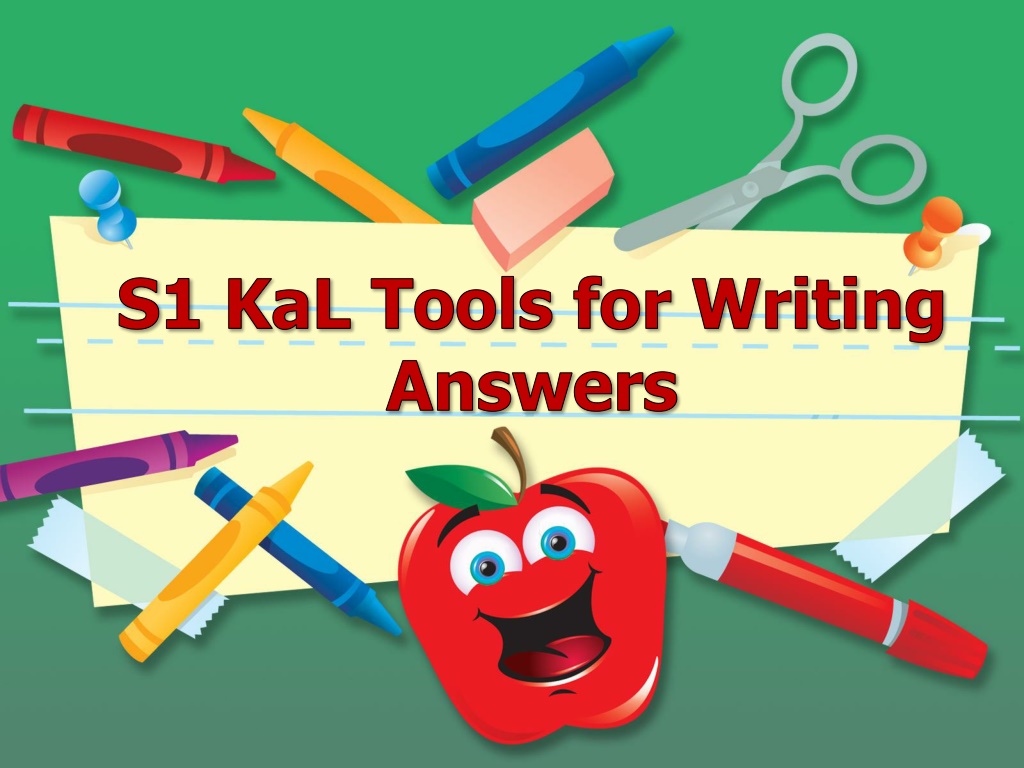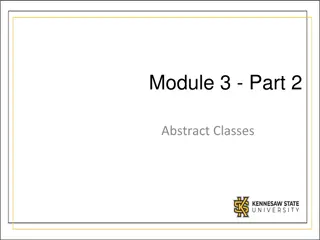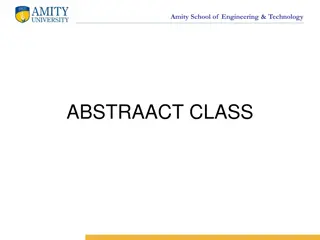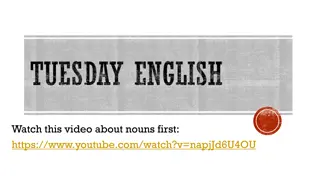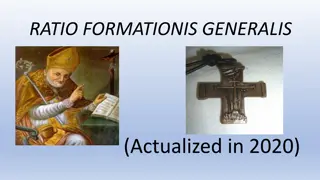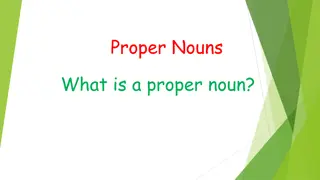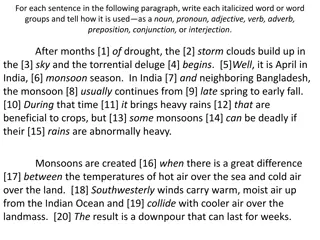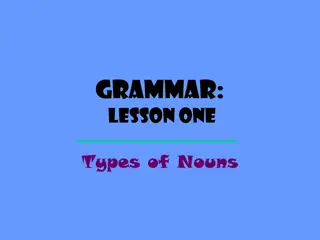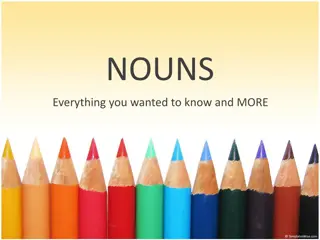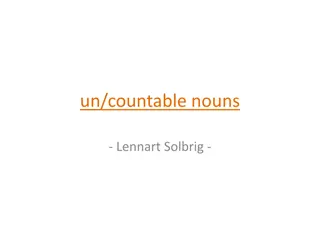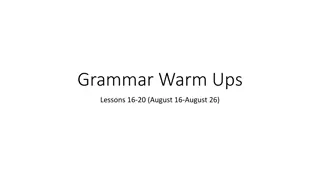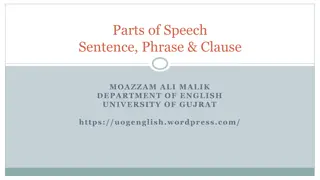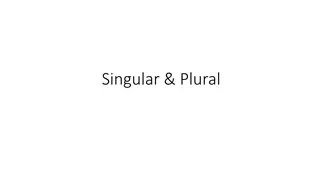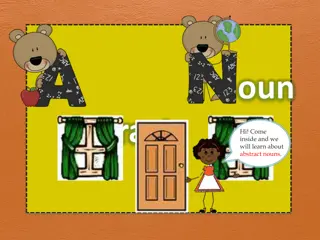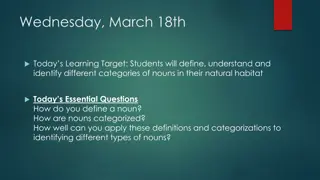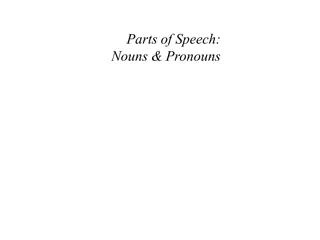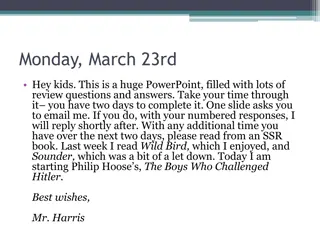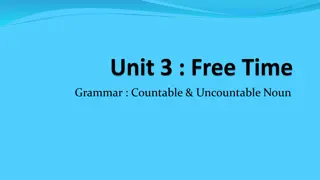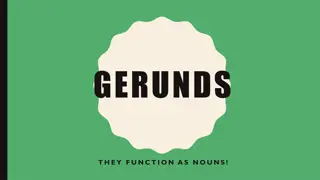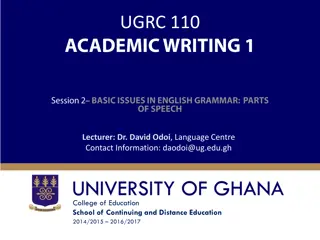Understanding Nouns and Abstract Nouns: Identification and Formation
Explore the world of nouns, including proper nouns and collective nouns. Learn to identify and correctly write proper nouns and match collective nouns with their respective groups. Discover abstract nouns and how to create them by adding "-ness" to words. Enhance your writing skills with these fundamental concepts.
Download Presentation

Please find below an Image/Link to download the presentation.
The content on the website is provided AS IS for your information and personal use only. It may not be sold, licensed, or shared on other websites without obtaining consent from the author. Download presentation by click this link. If you encounter any issues during the download, it is possible that the publisher has removed the file from their server.
E N D
Presentation Transcript
S1 KaL Tools for Writing Answers
A noun is the name of any person, place, animal or thing. 1. Proper Nouns particular person, animal, place or thing. Proper nouns always have a capital letter. For example: Lassie Cumbernauld Celtic A proper noun is the name of a
Task There are 10 proper nouns in the box. Write them correctly in the blank spaces below. kiera knightleyship box paris flu japan bicycle dog glasgow edinburgh castle glass rover cage rangers computers grass world cup madonna sunshine coffee buttons queen elizabeth pizza Kiera Knightleyship box Paris flu Japan bicycle dog Glasgow Edinburgh castle glass rover cage rangers computers grass world cup Madonna sunshine coffee buttons Queen Elizabeth pizza
Task Here is a list of collective nouns. Write the correct noun from the box in the blank spaces. flowers players books sailors bees soldiers 1. An army of soldiers 2. A team of players 3. A crew of sailors 4. A library of books 5. A swarm of bees 6. A bouquet of flowers
Task Choose a collective noun from the box to go with each of the groups in the list below. class warehouse orchard pack hanger basket 1. An orchard of apple trees. 2. A basket of puppies 3. A warehouse of furniture 4. A pack of wolves 5. A class of pupils 6. A hanger of aeroplanes
Abstract Nouns Abstract nouns are the words for all feelings, thoughts and ideas. They are things that you cannot see, touch or hear. For example: sadness anger friendliness
Task You can make some abstract nouns by adding the letters -ness to the end of a word. For example; happy - happiness Make the following into abstract nouns by adding -ness 1. kind 2. short - shortness 3. sad - sadness 4. smooth - smoothness 5. cold - coldness 6. clever - cleverness - kindness
Task Complete the sentences below by using one of the abstract nouns from the box. beauty cleverness skill cunning dishonesty courage 1. The thief was accused of dishonesty. 2. The hero was known for his courage. 3. The diamond ring was well known for its beauty. 4. The footballer was famous for his skill. 5. The teacher praised the pupil for his cleverness. 6. Foxes are famous for their cunning.
An adjective is a word that we use to describe a noun. For example: a stormy sea a thin man an angry dog
Task Underline the adjectives in the sentences below. The first has been done as an example. 1. 2. 3. 4. 5. 6. 7. The sky was blue and there were fluffy, white clouds. The dazzling sun shone in the bright sky. The sea was grey and enormous waves shook the tiny ship. The fields were green with the new grass in early Spring. Tall trees and thick hedges surrounded the ruined castle. Heavy rain fell on the dark, shining streets in the old town. The elegant woman wore high heels and a smart designer suit. Billy was a dreadful child wild, cunning and dangerous. The Queen s necklace had dark red rubies, and dazzling diamonds. 10. The 1970s school was in a bad state with rotting window frames and dull, depressing corridors. 8. 9.
Task Write 3 short sentences about this picture. Each sentence must have an adjective in it. Let the teacher have a look!
Comparative Adjectives We use these adjectives to compare two people or things. For example: Jimmy is taller than John. There are 2 ways of turning an adjective into a comparative: Add the letters er to the end. For example: tall taller. Put the word more in front of the adjective. For example: interesting more interesting
Task Write the comparative of the adjectives below. You will have to either add er to the end or put more in front. Harder Smaller Louder Cooler Kinder Smoother Fewer Faster Newer Older More modern More different More helpful More important More popular More beautiful More relaxed
Superlative of Adjectives The superlative adjective is used to compare one thing with all other things. For example: in the class. thinnest person. John is tall but James is the tallest Mary is thin, but Margaret is the There are 2 ways to make the superlative of an adjective. 1. Add the letters -est to the adjective. For example: small - smallest 2. Put the word most in front of the adjective. For example: beautiful - most beautiful
Task Write the comparative of the adjectives below. You will have to either add est to the end or put most in front. Fastest Oldest Biggest Loudest Newest Hardest Smallest Kindest Cool est Fewest Most popular Most helpful Most modern Most different Most important Most relaxed
Double Comparatives and Double Superlatives Double comparatives are, for example more bigger , more better. Double superlatives are, for example most cleverest , most nicest . If you use a double comparative or a double superlative it is like saying the same thing twice.
Task Tick the correct sentence in each pair of sentences below. The Eiffel Tower is the tallest building in Paris. Mary is cleverer than John. Coke is a tastier soft drink than Irn Bru. My teacher is the kindest person in the school. Windows 95 is an older Windows programs. Mice are some of the smallest mammals in the world. Butterflies are the loveliest insects. Wayne Rooney is the best footballer on the planet. .
The Auxiliary Verb A verb is a word that tells you what someone did. For example: Ted walked through the park. Some verbs are made up of more than one word. For example: Jane was walking with Ted. The extra word is called an auxiliary (helping) verb because it helps us to know more clearly what happened.
Task Choose the correct auxiliary verb from the box to complete the sentences below. 1. We were all talking at once. 2. You are able to work alone. 3. The girls will come to see you. 4. I should not have to do the dishes. 5. They could stay as long as they liked. 6. I will not go to the club tomorrow. 7. We will watch television tonight. 8. I have not seen the film before. 9. They should always be on time. 10.We will not be late for school again. 11.I was thinking about school. 12.They could play chess if they knew how.
Changing the Tense of the Verb (1) Tense means to do with time. The tense of a verb tells you when the thing happened now, in the past or in the future. Examples I am going to school. I went to school. This happened in When it happened This is happening now. Tense of the Verb Present Tense Past Tense the past. This will happen in the future. Future Tense. I will go to school.
Task The sentences below are all in the present tense. Write them out again below, changing the verb to the past tense. 1. My baby brother cried all night. 2. John swam for the school team. 3. I felt sick because I ate too much. 4. My parents told me off when I came home late. 5. Jim played for Stirling Albion.
Changing the Tense of the Verb (2) Task The sentences below are all in the past tense. Write them out again below, changing the verb to the present tense. 1. My mates are going to the disco. 2. The train to Manchester is leaving the platform on time. 3. The Queen is visiting the town and is waving to the people. 4. The mechanic is repairing the car and is driving it outside.
Task The sentences below are all in the future tense. Write them out again below, changing the verb to the present tense. 1. I am going outside to get some fresh air. 2. We will buy the newest CDs when we have enough money. 3. The dog at Number 14 barks when it hears us coming. 4. The library stays openuntil eight o clock tonight.
Nouns that Change Places with Verbs Some words can be used as a noun or as a verb. For example: (verb) drink Coke is a fizzy drink. (noun) We don t want to drink Coke any more. To think of the word as a noun, put the in front of it. To think of the word as a verb, put to in front if it.
Task Write a short sentence using the words below as both a noun and a verb, as in the example. I ll give her the ring tomorrow. Can you ring me please? Don t hammer so hard on that door. Let me borrow your hammer. The wave is breaking. Give us a wave. I ll suit myself. I need to buy a suit for the wedding. Watch what you re doing. That s a nice watch you re wearing.
Task Write a short sentence using the words below as both a noun and a verb, as in the example. I ll give her the ring tomorrow. Can you ring me please? Don t hammer so hard on that door. Let me borrow your hammer. The wave is breaking. Give us a wave. I ll suit myself. I need to buy a suit for the wedding. Watch what you re doing. That s a nice watch you re wearing.
Adverbs An adverb usually tells you more about a verb. Be careful. Adverbs generally, but not always, end in ly . Not all words that end in ly are adverbs. Write the following sentences into your jotter. Underline the adverb and the verb it tells you more about. Each sentence group contains two adverbs.
Exercise 1 Fire Escape 1. Fire! I shouted desperately. Fire! Already my room was densely filled with smoke. 2. I stumbled blindly to the door. Flames darted savagely at my face. 3. I slammed the door hard and rushed panic-stricken to the window. 4. I threw it open quickly. Outside the night sky was glowing brightly. 5. I vaguely heard screams and shouts mixed with the loudly wailing sirens. 6. Fire engines, police cars and ambulances were all driving madly about. I pulled myself clumsily onto the window sill, ready to jump. 7. I stared hopelessly down at the sickening drop. My vision blurred as my head spun giddily. 8. Stay where you are! I thought a voice shouted loudly. I paused, breathless. 9. Seconds later a ladder crashed heavily against the sill and a fireman pulled me to safety. 10. Thanks for telling me not to jump, I gasped hoarsely, trembling with shock and relief. 11. What? replied the man blankly. No one called to you. I fainted.
Exercise 2 This exercise describes the day of a thirteen year old scullery maid in the 1890s. Victorian Days 1.I rise wearily at 5.30, dressing hurriedly in the cold and dark. 2.Downstairs my first job is to light the kitchen fire. That quickly done, I have to heat the water so the squire can wash comfortably in warm water. 3.Other servants arrive. Everyone bustles about getting the family s breakfast. Cook is generally bad tempered at this time of the morning and scolds us fiercely. 4.After the family have had their breakfast we go to chapel. I love the hymns. I also smile shyly at Matthews, the groom. I think he s really wonderful. 5.When chapel is over, the kitchen maids begin their endless preparing of vegetables. I am forever hurrying to and fro fetching water from the pump in the yard. 6.Once the family have had lunch, I ve got sewing to do. I have to make all of my own clothes. I think it s incredibly unfair. The men servants get all their clothes freely provided. 7.The family eat about 8.00. Then I m rushing madly about, collecting dirty dishes from the service tray. Sometimes if I listen carefully, I can hear sounds of music and laughter coming from the dining room. It s like Heaven. 8.At 10.30 I am still washing dishes but I am hopelessly tired. I get one day s holiday a month. I earn only a few shillings a month. Sometimes I could cry with misery.
Adjectives and Adverbs An adjective is a word that tells you more about a noun (person, place, animal or thing). Examples of Adjectives Mary is a bad girl. John is a good boy. (Bad tells you more about Mary.) (Good tells you more about John.) An adverb is a word that tells you more about how something was done. Adverbs go with verbs (doing words). Examples of Adverbs Mary did her work badly. Badly tells how how Mary did her work. John did his work well. work. Well tells you how John did his
Task Write Adjective or Adverb after each sentence. 1. Anne plays the piano badly. Adverb 2. Jane is a tall girl. Adjective 3. Robert is feeling angry. Adverb 4. Gary is a brilliant footballer. Adjective 5. Amy does her maths properly. Adverb
Task Choose an adjective or an adverb from the box to complete the sentences below. 1. The teacher sings beautifully. 2. The boys play noisily in the playground. 3. The school is new and modern. 4. We like people who speak clearly. 5. Mum and Dad are very busy today. 6. John played the trumpet loudly.
Personal Pronouns Pro means instead of. A pronoun means a word that is used instead of a noun. Examples You use the pronoun I instead of your own name. You use the pronouns he or him instead of saying someone s name. You use the pronoun it instead of always saying, for example, the cat. Some pronouns are: I we he she it they you me him her them us
Task Underline the pronouns in the sentences below. There are 26 altogether. 1. The cat likes cream so they gave it some more. 2. Mary and Anne gave us some books and we gave them sweets. 3. He went to the match with us but we didn t think much of it. 4. Do you like computer games? I ve got some of them I could lend you. 5. When they came back from a trip to the cinema they told us all about it. 6. I d like him to know that they don t want me to come and visit them again. 7. She looked them up in the phone book to see if she could find out where they lived.
Task Underline the pronouns in the sentences below. There are 26 altogether. 1. The cat likes cream so they gave it some more. 2. Mary and Anne gave us some books and we gave them sweets. 3. He went to the match with us but we didn t think much of it. 4. Do you like computer games? I ve got some of them I could lend you. 5. When they came back from a trip to the cinema they told us all about it. 6. I d like him to know that they don t want me to come and visit them again. 7. She looked them up in the phone book to see if she could find out where they lived.
The Conjunction A conjunction is a word that you use to join two sentences together. Some conjunctions are: and because but so since Examples: Mary came home late last night. She went straight to bed. Mary came home late last night and went straight to bed. She went straight to bed. She was very tired. She went to bed because she was very tired.
Task Join the sentences below together using one of the conjunctions on the list above. 1. Gary was chosen for the team because he was a very good player. 2. He was a striker so the manager put him in goals. 3. Gary was not happy because he wanted to score goals. 4. He spoke to the manager and he was allowed to play up front. 5. Gary was much happier now and he scored lots of goals for the team.
Choosing the Conjunction There are lots and lots of conjunctions. Conjunctions are words that are used to join sentences together. 1. Jamie asked the teacher for a pencil sharpener as he had forgotten his own. 2. Sam could not get any pudding because he had eaten all his vegetables. 3. After Billy did his experiment he cleaned up. 4. Although Katie usually likes P.E. she did not want to do any last week. 5. When you see Sally, tell her I want to speak to her. 6. I can t tell yet if Charles likes this book or not. 7. You cannot go to see the film unless you pay for the ticket now. 8. Harry was too late for the football match because he watched the tennis instead. 9. Because she didn t want to speak to her awful cousins, Marian went out with her friends. 10.While George and his family were having breakfast, a fire engine arrived outside.
Conjunctions to do with time Task Write a conjunction from the box in the blank spaces in the sentences below. 1. 2. 3. She watched the car when it turned the corner. The striker waited patiently while he saw a chance to score a goal. Since he had to give up work because of an accident, my Dad has been out of a job. My teenage son sleeps and takes it easy while I go out to work. I always think carefully before I answer questions in a test. When I moved suddenly the guard dog growled fiercely. I am ready when you want to go home. I ll come round to your house whenever you say. Since she had finished her homework, Susan went out to see a film. 10. When the pupils stopped talking, the Head Teacher started to speak. 4. 5. 6. 7. 8. 9.
Special Meaning Conjunctions Task Write a conjunction from the box in the blank spaces in the sentences below. 1. I didn t want Emma at my party until she promised to behave herself. 2. Because it was a summer party, all the guests wore shorts and tee- shirts. 3. Although there were lots of activities, we all decided played Rounders. 4. We were all very excited because of how close the game was. 5. Mum said the game would have to end unless people were sick with excitement. 6. We asked if we could stay all evening although we already knew that Mum would say no. 7. We could not decide whether to go on playing or to stop when the ice cream arrived. 8. I wanted to finish the ice cream but Mum said no.
The Wrong use of Then and So Then means the next thing that happened. We went into the shop and then we bought a pen. So means because of something that has happened. I wanted a pen, so we went into the shop.
The Wrong use of Then and So Task Fill in either then or so in the sentences below. 1. Uncle George took me on a visit to London last Saturday so we went on the Underground to Baker Street Station, then it was a short walk to Madame Tussaud s Museum. 2. I wanted to see the Chamber of Horrors so we went to see all the murderers, then we went next door to the Planetarium. 3. Then after lunch we went for a walk by the Thames so that we could see the Houses of Parliament. 4. Then we visited Westminster Abbey so that we could see the old tombs. 5. Then we took a taxi so that we could go home by train. 6. We told Mum and Dad what we had seen and then we had supper. So it was a great day out.
The Wrong use of Then and So Task Fill in either then or so in the sentences below. 1. Uncle George took me on a visit to London last Saturday so we went on the Underground to Baker Street Station, then it was a short walk to Madame Tussaud s Museum. 2. I wanted to see the Chamber of Horrors so we went to see all the murderers, then we went next door to the Planetarium. 3. Then after lunch we went for a walk by the Thames so that we could see the Houses of Parliament. 4. Then we visited Westminster Abbey so that we could see the old tombs. 5. Then we took a taxi so that we could go home by train. 6. We told Mum and Dad what we had seen and then we had supper. So it was a great day out.
Connectives and Compound Words Look at this list of connectives. Connectives are used to link one sentence to another or to extend a sentence. whoever nonetheless therefore although furthermore whereas nevertheless moreover whatever meanwhile while and since if for when however so besides but henceforward notwithstanding because whenever yet until then alternatively with after as consequently
